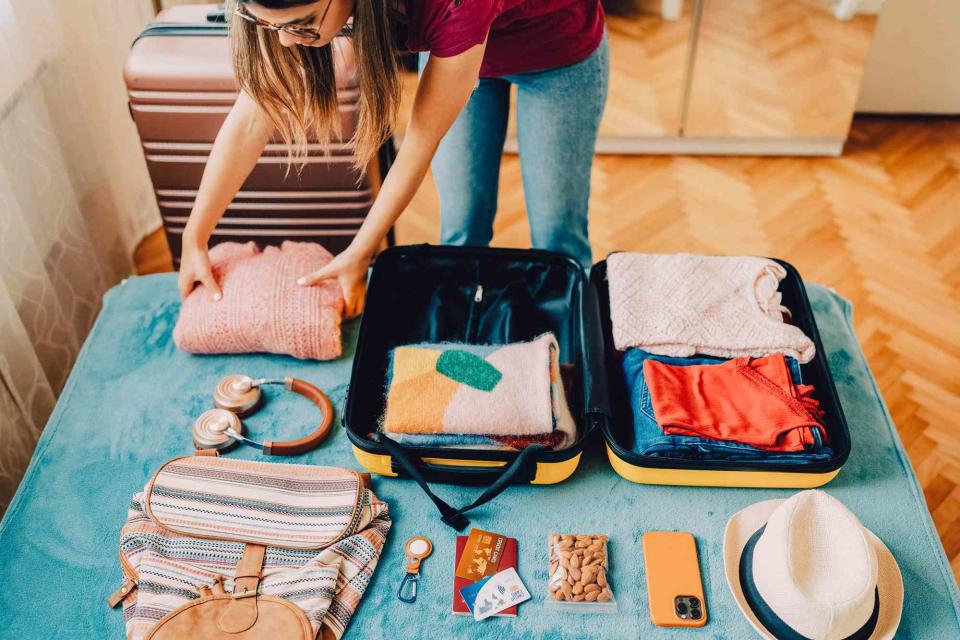Heading Back to College? Tips Pros Want You to Know
Before you start packing up your shower caddy and desk lamp, make sure you’ve taken care of everything on our expert-recommended “must do” list ahead of your return to campus

Getty Images
The first year of college is a whirlwind of change: new school, new friends, new living situations, new responsibilities. You learn a lot, and you might head back to campus thinking you’ve got the place figured out. But there’s still a lot to prepare for in those second, third, and fourth years!
“I think for upper level students and especially for sophomores, they don't realize how different the next year is gonna be,” says Tyler Page, PhD, director of residential life at the University of Missouri-Columbia.
The best thing you can do is just try and prepare. Luckily, there’s still plenty of time to take apply these back-to-college tips from the experts before you head back to school and the whirlwind recommences.

Getty Images
College student talking to doctorGet your check-ups before you go
Summer break, especially if you’re home with your parents, is a great time to catch up on doctors’ visits that may be hard to schedule while you’re on campus. “The most important thing is having an annual physical,” says Dyan Hes, MD, the director of pediatrics at the Concorde Medical Group of Northwell Health in New York City.
You may be able to get in to see your childhood pediatrician, as some see patients past age 18, but if not, they should be able to recommend a general practitioner or family medicine doctor.
“When you go to your annual, you should also get checked for STIs (sexually transmitted infections),” says Dr. Hes. (Don’t stress— your parents won’t be informed of the results unless you want them to be.)
You should also use this appointment to make sure you’re up-to-date on any vaccination series you’re eligible for. “Often, you’ll need a meningitis B vaccine for college— and you can’t register for classes without it,” says Dr. Hes, who adds that everyone should be sure they’ve had their HPV vaccine, especially men, as the vaccine was initially targeted towards women to prevent cervical cancers. You may also need a tuberculosis test.
Dr. Hes also suggests using this summer as a chance to have a real talk with your parents about your medical history. “Kids will be filling out forms and they don’t know if they’ve had chicken pox, or if they’re allergic to penicillin,” she says. If this sounds like you, text your parents right now and ask! You’re in college now; you should know the answers.
Track down any important documents
Take photos of everything if you’re home, so you have a record before you go back to living on your own. (You do not want to be calling your mom from the ER at 3:30 a.m. to ask her for your insurance information.)
“Make sure you have a copy of your insurance card on your phone, as well as a copy of your vaccination records,” says Dr. Hes. You also might want to get a HIPAA release set up for your parents (you can find one online by searching your state + HIPAA release). “You can sign a HIPAA release if you want your parents to be able to see your medical records,” says Dr. Hes. “And you don't have to sign a HIPAA release if you don't, because you're an adult.”
You should also have a photo of your passport on your phone, as well as a copy of your drivers’ insurance if you drive. And if you’ll be bringing your car off-campus, make sure you have your parking pass, suggests Carrie Grogan Abbott, director of New Student Programs at Syracuse University.
Related: Suni Lee's Back-to-School Style and Beauty Essentials
Give your phone a refresh
This is a great moment to download some apps that will save your sanity once the year starts, says Niki Patton, a TikTok content creator with 1.8 million followers, who creates mega-popular videos about college life.

Nikki Patton/ Instagram
Niki Patton“I think it's important to have some sort of reminder or planner app that will remind you when you're gonna miss a due date,” she says. (Apps like Microsoft To Do and My Tasks do this!)
She also loves apps like Course Swiper and Coursicle, which let you know when a spot opens in a tough-to-get-in-to class so you can rush to register. “It's gotten me into like three classes that I would have not been able to register for otherwise,” she says.
You can also make sure you have the app for your healthcare system, like MyChart, installed on your phone, suggests Dr. Hes, so you have easy access to your medical records. (And make sure you know the username and passwords!)
If you haven’t already done it, save the phone number of the campus police as a contact, says Patton— you won’t be able to conjure it up from memory in an emergency.
Patton also swears by turning your location sharing to “always on” with your group of friends for safety tracking— if you’re not already doing this, now’s a great time to start.
Lastly, check and see if your school has any new campus-specific apps that might make your life easier: At Syracuse, “we have a really robust safety app that can connect you with a friend if you're walking home, as well as other safety resources,” says Abbott. There’s also a bus tracking app for students using university shuttles. Just type your school’s name into the app store and make sure you have everything they offer!

Getty Images
Roommate discussionPrep for your new living situation
“Sophomores are typically changing from their assigned first year-roommate to somebody that they've connected with during their first year, so there's going to be some transition to living with a friend,” says Abbott.
It’s counterintuitive, but moving in with a friend can often lead to more conflict, as neither one of you wants to be confrontational with someone in your social circle. So before moving in, hash out — and write down — your policies on things like utilities (who’s paying?), chores (how often?), groceries (do you share?) and guests. (Our sister brand the Spruce has a great checklist for that first conversation.)
“Before [anything] becomes an issue, sit down with a notepad and say, all right, how are we doing this? Let's come to an agreement ahead of time,” says Page.
You’ll also want to give some thought to safety in your new digs: if you’re moving to an off-campus apartment building, for example, remember not to hold the lobby door for people behind you. “One thing I learned in college is, it’s a little awkward, but you have to [close the door],” says Patton. “If they're meant to be in the building, they'll let themselves in. You want to hold the door open out of courtesy, but it's really not safe.”
Related: Tired Mom Shares Relatable Back-to-School Photo with the Perfect Sign for Parents
Pack smart
Freshman year is all about buying new stuff for life in a dorm, and it likely all came home with you when you packed up last spring. Take a few minutes this summer to re-evaluate whether you need everything you brought,says Patton. (One of her most viral videos covers what not to bring to campus.)
Did you actually make your bed each day? Then maybe don’t bring so many throw pillows. Did your string lights fall on your head constantly? Skip the *~aesthetic*~ wall decor. “There are so many printers on campus. You really don't need to be plugging a printer into your room!” says Patton.
Other items Patton advises against bringing (but sees constantly) include ironing boards, tons of cutlery/plates/cups, high school t-shirts, and too many shoes. If you wore the same pair of sneakers or slides daily, don't pack fifteen pairs of "just in case" heels; the day will never come.
Patton also has a list of favorite items for returning students that she herself didn’t have until she was an upperclassman: stacking hangers, space-saving storage ottomans, and a Swiffer.
You’ll also want to make sure you’re prepared to pack any “maintenance medications” you might be on, like birth control pills, allergy medicines, or, if you’re a sexually active man who has sex with men, PrEP, says Dr. Hes. (Depending on your health insurance, she notes, you may have to fill these prescriptions while you’re home, because out-of-state pharmacies may not be covered.)

Getty Images
College student packing and getting phone up to dateGive some big-picture thought to your “college experience”
Maybe the summer has given you some clarity on what you want to major in, or your future career path, and you’re not sure how to make those changes on campus. As you head back, “probably my biggest tip to give to upper level students is to ask for help,” says Page.
Your school most likely has tons of resources in place to help you navigate your academic life— use them! “Almost every school has an office called either student affairs, or student life, and that office will be well versed in the resources available. They may not be the experts, but they're going to understand what you're saying, and they're gonna refer you appropriately,” says Page. “Instead of you having to run around trying to navigate things yourself, go to them and leverage them. That's exactly why those offices are there.”
He also suggests setting up a meeting time with your advisor to go over your plan towards graduation: How will your course load be structured? Will you be studying abroad? Spending some time those first few weeks of fall semester is a great idea, says Page. “In the first part of the semester, your advisors typically have the greatest availability because they're not slammed with a bunch of advising appointments. It’s an awesome opportunity.” And if there’s anything you want to change, now’s the time! This includes the people you’ve been spending time with: Do you feel like you’ve found your best friends? If not, it isn’t too late to join a new club or try a new activity.
“Sophomore year is still an opportunity for students to get involved—sometimes the students think that that is a freshman year activity, but it's ok to still be looking to connect with friend groups,” says Abbott. “You're continuing to explore involvement opportunities, through your sophomore year and beyond.”
Page agrees: "Staying engaged on campus—it just does a world of benefit for you.”
For more People news, make sure to sign up for our newsletter!
Read the original article on People.

